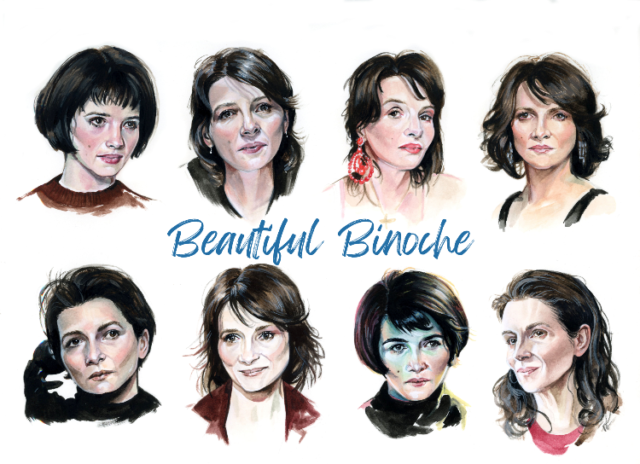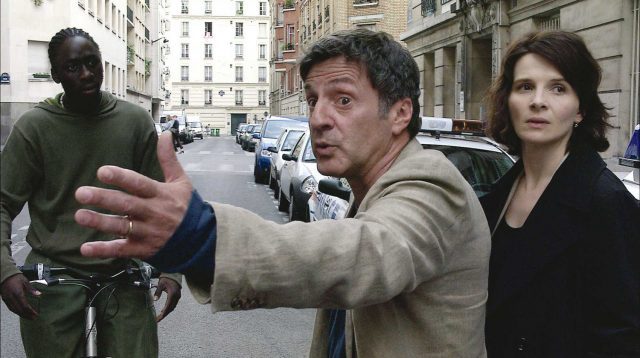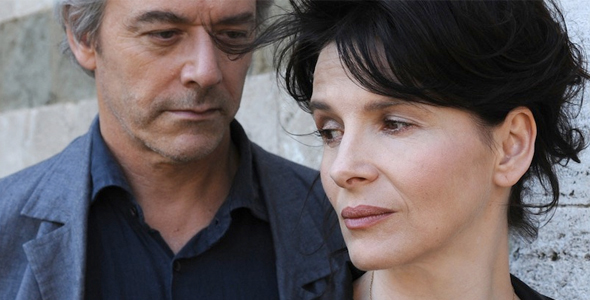
Quad series celebrating Juliette Binoche runs August 4-10 (artwork by Brianna Ashby)
BEAUTIFUL BINOCHE
Quad Cinema
34 West 13th St. between Fifth & Sixth Aves.
August 4-10
quadcinema.com
In preparation for the August 11 opening of her latest feature, Emmanuel Carrère’s Between Two Worlds, the Quad is taking a look back at the career of award-winning French actress Juliette Binoche with eight of her most well known works. “Beautiful Binoche” kicks off August 3 with Philip Kaufman’s 1988 adaptation of recently deceased Czech author Milan Kundera’s The Unbearable Lightness of Being, which had been thought to have been impossible to film. The nearly three-hour story of a love triangle set in the Czech Republic in the late 1960s is screening August 4 at 3:30 and 7:00; the first show will be introduced by Columbia professor and author Annette Insdorf, the second by producer Paul Zaentz.
Insdorf will also introduce the 5:00 screening on August 6 of Krzysztof Kieślowski’s 1993 Three Colours: Blue, about tragedy and liberty, the first of a trilogy, while Zaentz will be back August 6 at 7:00 to introduce Anthony Minghella’s 1996 The English Patient, for which Binoche won a Best Supporting Actress Oscar for her portrayal of a French-Canadian combat nurse during WWII. Louis Malle’s 1992 Damage, in which Binoche stars as a political femme fatale involved with a Member of Parliament played by Jeremy Irons, screens twice on Saturday, while Claire Denis’s 2017 Let the Sunshine In, loosely adapted from Roland Barthes’s A Lover’s Discourse: Fragments, is being shown twice on August 10, with the 5:00 screening introduced by Jourdain Searles.
Binoche, who has appeared in more than seventy films since her 1983 debut, has perhaps worked with more of the world’s greatest directors than any other living performer, an astounding array of international creators that also includes André Téchiné, Jean-Luc Godard, Leos Carax, Lasse Hallström, John Boorman, Abel Ferrara, Amos Gitai, Hou Hsiao-hsien, David Cronenberg, Sylvie Testud, Hirokazu Kore-eda, and Christophe Honoré. Below is a look at the three other films that are part of the Quad series, which runs August 4-10 and concludes with a sneak preview of Between Two Worlds.

Daniel Autieul and Juliette Binoche star in Michael Haneke’s Caché
CACHÉ (HIDDEN) (Michael Haneke, 2005)
Monday, August 7, 5:00 & 7:30
quadcinema.com
sonyclassics.com/cache
Michael Haneke was named Best Director at Cannes for Caché, a slow-moving yet gripping psychological drama about a seemingly happy French family whose lives are about to be torn apart. The film stars Daniel Auteil as Georges, the host of a literary public television talk show, and Juliette Binoche as his wife, Anne, a book editor. One day a mysterious videotape is left for them, showing a continuous shot of their house. More tapes follow, wrapped in childish drawings of a boy with blood coming out of his mouth. Fearing for the safety of their son, Pierrot (Lester Makedonsky), they go to the police, who say they cannot do anything until an actual crime has been committed. As the tapes reveal more information and invite more danger, Georges’s secrets and lies threaten the future of his marriage.
Caché is a tense, involving thriller that is both uncomfortable and captivating to watch. Haneke zooms in closely on the relationship between Georges and Anne, keeping all other characters in the background; in fact, there is no musical score or even any incidental music to enhance the searing emotions coming from Auteil and Binoche. Winner of numerous year-end critics awards for Best Foreign Language Film, Caché is screening August 5 at the Quad. Oh, and be sure to pay close attention to the long final shot for just one more crucial twist that many people in the audience will miss.

William Shimell and Juliette Binoche both play annoying characters you will not want to hang out with in Certified Copy
CERTIFIED COPY (COPIE CONFORME) (Abbas Kiarostami, 2010)
Tuesday, August 8, 5:00 & 7:00
quadcinema.com
www.ifcfilms.com
Writer, director, poet, photographer, editor, graphic designer, and painter Abbas Kiarostami was one of Iran’s leading filmmakers for nearly forty years before his death in 2016, compiling a resume that includes such important international films as Under the Olive Trees (1994), Taste of Cherry (1997), and The Wind Will Carry Us (1999). Certified Copy was his first feature made outside of his home country, a dreadfully boring and annoying art-infused romantic comedy set in Italy. Juliette Binoche was named Best Actress at Cannes for her starring role as an unnamed single mother and antiques dealer who is obsessed with English author James Miller’s (British opera star William Shimell) book on the history and meaning of art replicas, titled Certified Copy. Inexplicably, the two strangers are soon on a bizarre sort-of date, driving through Tuscany and becoming involved in a series of vignettes about love and marriage, literature and art, and other topics.
Both characters are seriously flawed and emotionally unstable in ways that make them unattractive to watch, especially in obvious set-ups that either go nowhere or exactly where you think they’re going. While Julie Delpy and Ethan Hawke made the somewhat similar Before Sunrise and Before Sunset, in which two strangers from different countries spend a day together (but mostly by themselves), the sexual tension and excitement always building, Certified Copy is more reminiscent of Hans Canova’s ridiculous Conversations with Other Women, in which Aaron Eckhart and Helena Bonham Carter play wedding guests with a past whom viewers can’t wait to just shut up and get off the screen. Don’t let the supposed adult dialogue of the overrated Certified Copy fool you into thinking it’s an intelligent, mature look at believable relationships; instead, it feels like a staid copy of other, better films you think you’ve seen but can’t remember — and won’t care. Certified Copy is screening on August 8 at the Quad; the 7:00 show will be introduced by film critic Simon Abrams, who likely appreciates it more than I do.
CLOUDS OF SILS MARIA (Olivier Assayas, 2014)
Wednesday, August 9, 5:00 & 7:30
quadcinema.com
www.ifcfilms.com
The related concepts of time and reality wind through Olivier Assayas’s beautifully poetic, melancholy Clouds of Sils Maria, much like actual snakelike clouds slither through the twisting Maloja Pass in the Swiss Alps, as life imitates art and vice versa. Juliette Binoche stars as Maria Enders, a famous French actress who is on her way to Zurich to accept an award for her mentor, playwright Wilhelm Melchior, who eschews such mundane ceremonies. But while en route, Maria and her personal assistant, the extremely attentive and capable Valentine (Kristen Stewart), learn that Wilhelm has suddenly and unexpectedly passed away, and Maria considers turning back, especially when she later finds out that Henryk Wald (Hanns Zischler), an old nemesis, will be there to pay homage to Wilhelm as well, but she decides to go ahead after all. At a cocktail party, Maria meets with hot director Klaus Diesterweg (Lars Eidinger), who is preparing a new stage production of Wilhelm and Maria’s first big hit, The Maloja Snake, but this time Maria would play Helena, an older woman obsessed with ambitious eighteen-year-old Sigrid, the role she originally performed twenty years earlier, to great acclaim. Klaus is planning to cast Lindsay Lohan–like troublemaking star and walking tabloid headline Jo-Ann Ellis (Chloë Grace Moretz) as Sigrid, which does not thrill Maria as her past and present meld together in an almost dreamlike narrative punctuated by the music of Handel and cinematographer Yorick Le Saux’s gorgeous shots of vast mountain landscapes.

Valentine (Kristen Stewart) and Maria (Juliette Binoche) go in search of the Maloja Snake in the Swiss Alps
Clouds of Sils Maria resonates on many levels, both inside and outside of the main plot and the film itself. Assayas (Irma Vep, Demonlover) cowrote André Téchiné’s 1983 film, Rendez-Vous, which was Binoche’s breakthrough; Assayas and Binoche wouldn’t work together again until his 2008 film Summer Hours, similar to the relationship between Wilhelm and Maria. Meanwhile, the story of the play-within-the-film is echoed by the relationship between Maria and Valentine, who are having trouble separating the personal from the professional. It is often difficult to know when the two women are practicing lines and when they are talking about their “real” lives. Binoche is simply extraordinary as Maria, a distressed and anxious woman who is suddenly facing getting older somewhat sooner than expected, while Stewart became the first American woman to win a French César, for Best Supporting Actress, for her sensitive portrayal of Valentine, a strong-willed young woman who might or might not be holding something back. The scenes between the two are riveting as they venture in and out of the reality of the film, their onscreen chemistry building and building till it’s at last ready to ignite. Art, life, cinema, theater, fiction, and reality all come together in Clouds of Sils Maria, as Maria, Assayas, and Binoche take stock of where they’ve been, where they are, and where they’re going.
